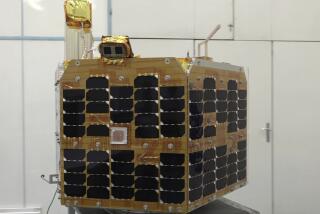Russian Rocket Bearing Satellite Fails
MOSCOW â In a setback for the Russian space program, a Zenit-2 rocket bearing a Russian military satellite crashed to Earth and burned Tuesday moments after taking off from Baikonur Cosmodrome in Kazakhstan.
The launch failed when the engine in the first stage of the rocket inexplicably shut down 48 seconds after launch, Russian authorities said. Further launches of Zenit rockets were immediately suspended until investigators can determine what caused the failure.
Sea Launch, a multinational venture to launch rockets from an ocean-going platform to be based in Long Beach, plans to use a similar model. But officials from Boeing Co., one of the partners in the project, said the crash did not shake their faith in the Zenit.
âOur first launch is not until late next year, which gives them ample time to figure out what went wrong,â said David Suffia, a Boeing spokesman in Seattle. âThat rocket has a very reliable history.â
The failure is a serious blow to the Russian military, which has had difficulty maintaining its network of surveillance satellites since the collapse of the Soviet Union.
The satellite destroyed in the crash was one in the Kosmos series, believed to be primarily a spy satellite. Earlier this year, military officials acknowledged that so many of their satellites had failed in orbit that Russia had lost the ability to monitor its vast land mass from space.
In an apparent attempt to rebuild the network, two Kosmos satellites were successfully launched earlier this month by Zenit-2 rockets from the same launch pad at Baikonur, the longtime Soviet cosmodrome located about 1,275 miles southeast of Moscow.
The destroyed satellite, valued at $17 million, was not insured and represents a major loss for Russia at a time when it is unable to pay wages and pensions or maintain many basic government programs.
According to Interfax news service, the crash was the seventh failure of a Zenit-2 rocket in 28 launch attempts since the Russian- and Ukrainian-made rocket first came into use in 1985. The worst incident occurred in 1990, when a rocket exploded on the ground and destroyed one of the launch pads at Baikonur.
Russia suffered a catastrophe last year when a Mars probe crashed back to Earth shortly after liftoff. It was launched by a Proton rocket, which was later judged not to have caused the failure. The first Proton launch since that crash is set for Saturday, when the rocket will put a Telstar communications satellite into orbit for Loral Space & Communications Ltd.
In Tuesdayâs crash, the rocket and satellite fell to Earth about 15 miles from the launch site in a remote area, setting off a large explosion and fire. No one was injured.
Sergei Puzanov, a space analyst now working on a joint U.S.-Russian project, said the failure may have occurred in part because rocket manufacturers can no longer afford to test rockets to the degree they could in Soviet days.
The disaster could have been much greater, he noted, if the explosion had destroyed the launch pad, the last one capable of launching the Zenit-2 at Baikonur.
âEvery space-faring nation has had similar problems,â Puzanov said. âSpace is not a sure thing, and you canât say that if you build a rocket it will fly every time.â
More to Read
Sign up for Essential California
The most important California stories and recommendations in your inbox every morning.
You may occasionally receive promotional content from the Los Angeles Times.









